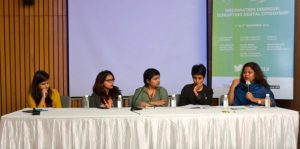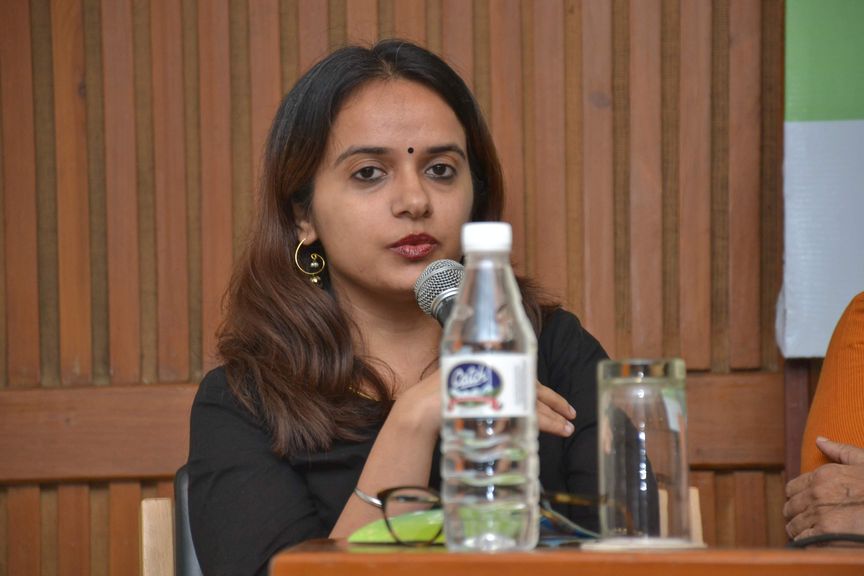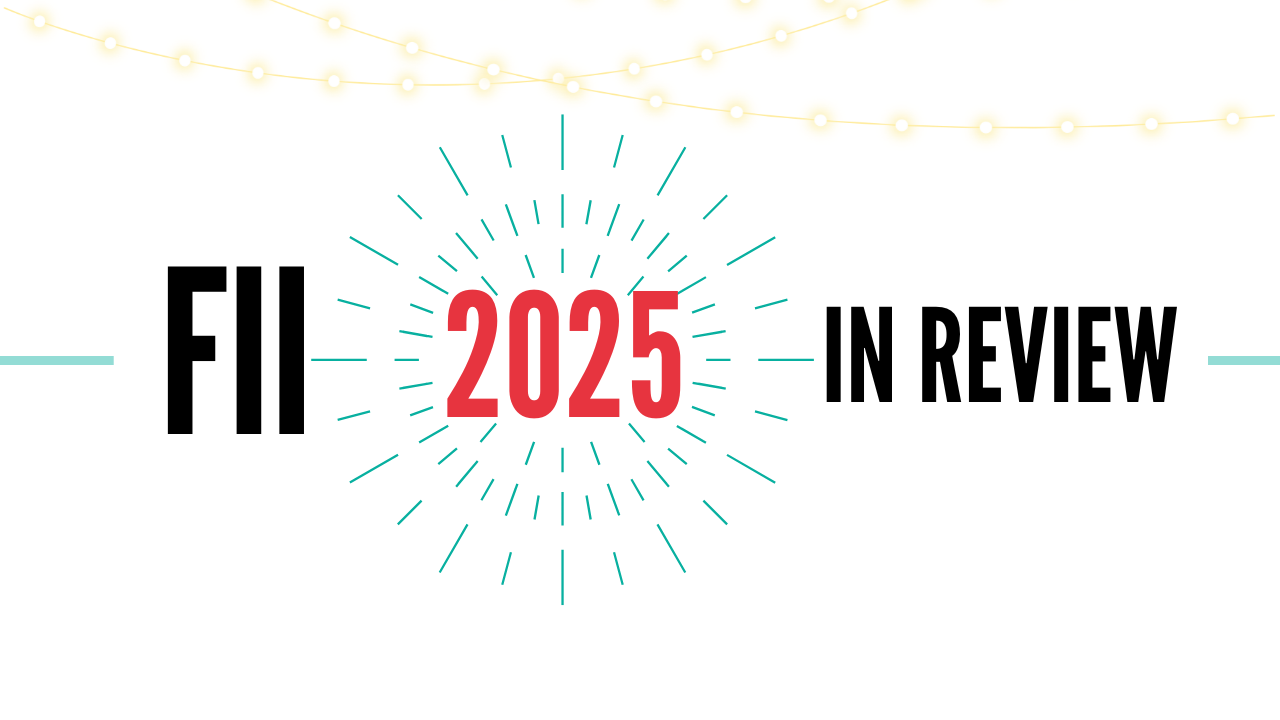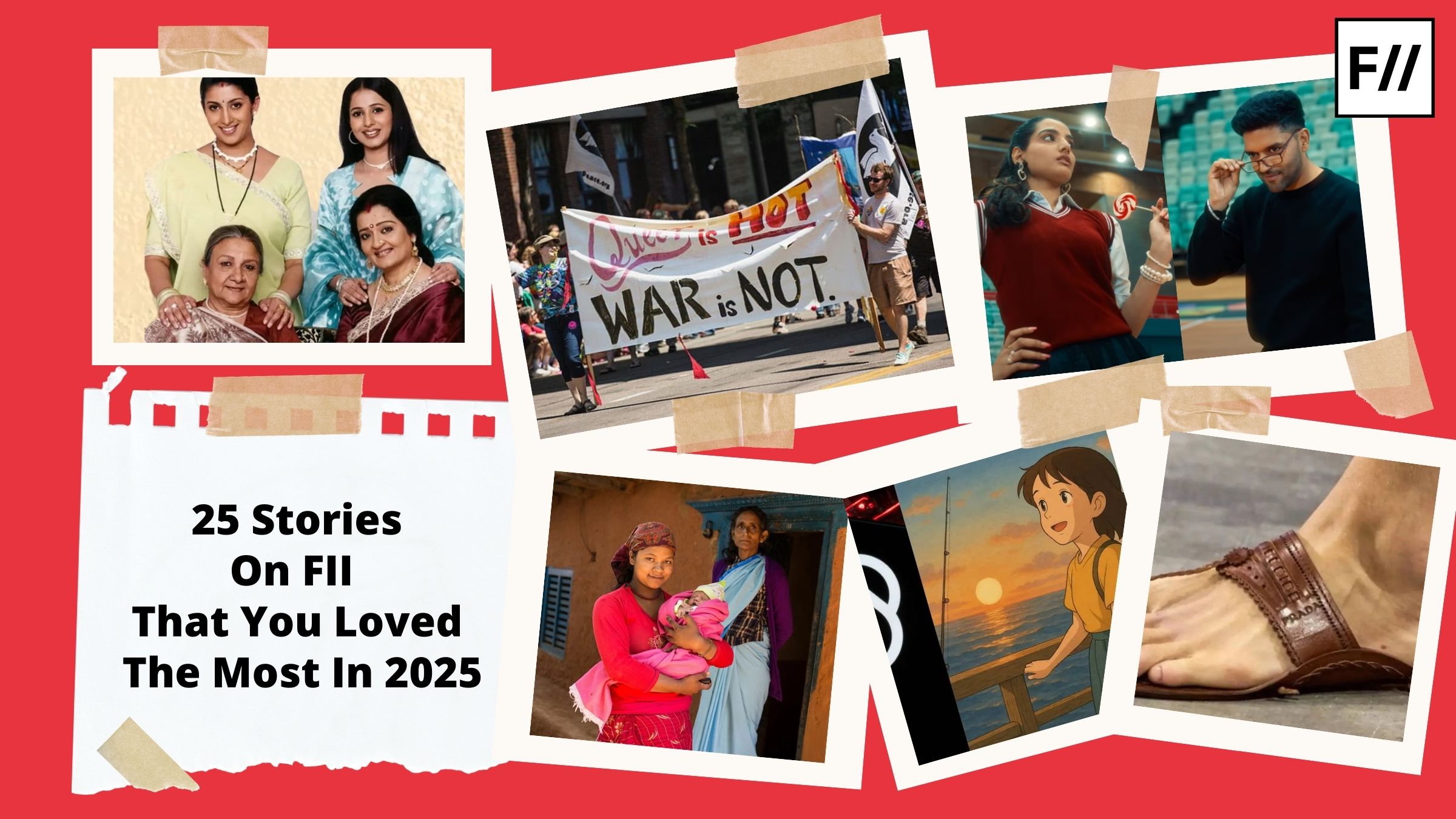The Digital Citizen Summit (DCS) which is conducted every year by the Digital Empowerment Foundation (DEF) aims to raise awareness about internet rights, digital literacy, and digital security. It focuses bringing together different communities and discussing the various uses and shortcomings of the internet and ways to improve its accessibility.
Feminism in India attended this year’s Digital Citizen Summit and hosted and participated in seven panels.
1. Intermediary Liability And Gender-Based Violence
We are at #DCS2018 by @DEFindia and FII founder @japna_p is speaking at a panel on gender based violence and intermediary liability by @cis_india. pic.twitter.com/KZm6h5qmxp
— Feminism in India (@FeminismInIndia) November 1, 2018
This session was held by Centre for Internet Society, where the panel discussed how gender-based violence can be curbed. While some argued that we needed stricter adherence to the existing laws, Japleen pointed out that a community based approach might be more practical. When platforms are held accountable for the kind of discussions held in their space, there might be a better chance of curbing discriminatory elements. What was also pointed out, was that the platforms must not also end up as a space that merely dictates policies and takes censorship so seriously that it starts affecting an individual’s freedom of expression, however dissenting.
2. Online Harassment: The New Form of Intimidation

In this session, which was hosted by SFLC.in, the panel talked about the different ways to cope with harassments and trolls. Sanghapali Aruna Lohitakshi spoke of how Dalit people had lesser access to internet itself and have been gaining an online presence in the recent times. While an online space provides them a direct platform, it also makes them vulnerable to more attacks and discriminatory remarks. Japleen also spoke of how sometimes you can take a break from wanting to putting yourself out there and trying to make a difference and just ignore the negativity, prioritising one’s mental health and peace of mind.
3. Online Media, Misinformation And Fake News
FII team @japna_p and @asmitaghosh18 held a workshop on how mainstream media gets rape reportage wrong for #DCS2018 by @DEFindia. #GBVinMedia pic.twitter.com/s7gL0FImWc
— Feminism in India (@FeminismInIndia) November 1, 2018
This workshop conducted by Feminism in India dissected different ways that media wrongly portrayed gender-based violence. From captions of news articles that either subtly or outright victim-blamed or slut-shamed the survivors or victims of rape, sexual assault and other forms of gendered violence to using images in the articles that either unlawfully identify the victim, rob them of their dignity, or portray them to be helpless and shameful, Indian media have been letting down the victims. We also showed alternative ways of sensitively reporting such news in terms of information shared, language used, and images embedded.
4. Accessing LGBTQIA+ Rights Using The Internet
In our final panel for the day at #DCS2018, FII & @vartatrust co-hosted a panel on accessing LGBTQ+ rights and services using the internet. @DEFindia pic.twitter.com/rUQh1D97Js
— Feminism in India (@FeminismInIndia) November 1, 2018
In this panel which was co-hosted by Feminism in India and Varta Trust, the discussion revolved around how the internet provided safe space for the queer people to get together and form communities, while it also made them vulnerable to trolls. Japleen spoke of the crowdsourced list of social justice collectives across Indian campuses that Feminism in India released earlier this year. She spoke of how it would benefit students from marginalised communities who enter universities as they would have easy access to such support groups.
5. Re-Imagining Online Censorship
We are kicking off Day 2 of #DCS2018 at a panel by @lovemattersinfo on a feminist internet! @DEFindia pic.twitter.com/kdrBbxxakt
— Feminism in India (@FeminismInIndia) November 2, 2018
In this session, which was conducted by Love Matters India, the participants discussed the various hurdles of censorship that they have had to cross. Japleen spoke about how her personal Facebook account in fact had been suspended about 4-5 times for the sole reason that she posted pictures which had women showing their nipples. Ishmeet Nagpal also spoke of how her own videos were taken off of YouTube as it had discussions on pornography. A representative from Love Matters India pitched in by saying that their posts were taken down or not approved for paid promotion because they had talked about sexual health and sexuality education in those posts.
6. How Do Women With Disabilities Experience The Internet
Today at #DCS2018, FII (@asmitaghosh18) hosted a panel on how women with disabilities experience the internet with 3 fantastic panellists! We spoke about accessibility, online harassment and the community building potential of the internet! #DigitalHifazat @DEFindia pic.twitter.com/2auQHMqoq2
— Feminism in India (@FeminismInIndia) November 2, 2018
This session was held by Feminism in India where disability rights activists, namely, Preeti Monga, Shivangi Agrawal, and Pratishtha Deveshwar spoke of the positive and the negative impacts of the internet. While they discussed the accessibility to create communities and safe spaces which help amplify their activism, they also mentioned how it made them susceptible to online abuse and harassment which are usually gender-based. They also brought into view the lack of accessibility they still had to face in the digital world.
Shivangi Agrawal shared her own instance, where as she has only three fingers the Aadhaar officials were unsure of how record her biometrics. They finally accounted that she had no hands in her official document which prevents her from using her thumb prints to avail other facilities. Preeti Monga also spoke of how the graphics and photographs on the internet does not allow visually disabled people to have access to information.
7. Valedictory Session
In the valedictory session at the end of Day 2, all panellists were asked to summarise the highlights of the seven themes of the Summit. Japleen summarised the ‘Feminist Internet’ track and mentioned the highlights from the various sessions under this track. Japleen concluded the session by saying, “The internet is a reflection of the society we live in and to truly achieve a feminist internet, we first need to work on a feminist world.”
 The overall experience was truly enriching as we got to interact with different people and were introduced to new perspectives. Do join us at our future talks and workshops!
The overall experience was truly enriching as we got to interact with different people and were introduced to new perspectives. Do join us at our future talks and workshops!
About the author(s)
Feminism In India is an award-winning digital intersectional feminist media organisation to learn, educate and develop a feminist sensibility and unravel the F-word among the youth in India.




